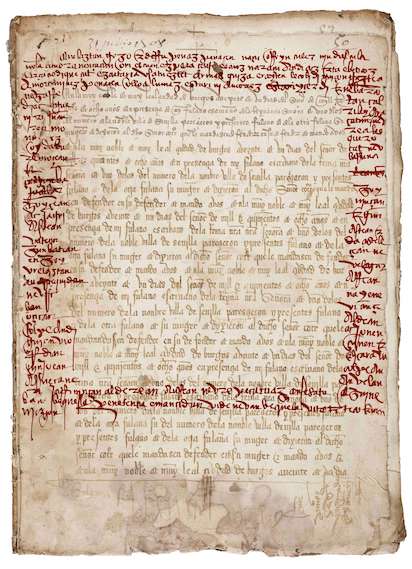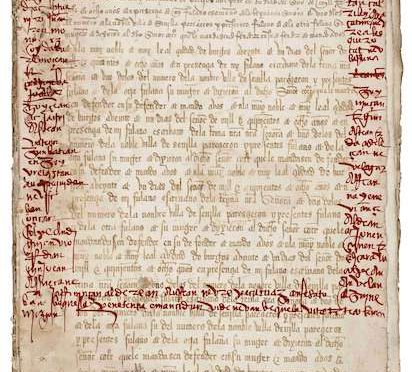One of the challenges with studying and understanding the origins and evolution of the Basque language is simply that it is only until relatively recently that it has been written down. Thus, whenever a new fragment of Euskara is discovered, it is a big deal. While the oldest known phrases in Euskara data back to 950 or so, the oldest text is a letter written in 1537 by the then-bishop of Mexico. Or, it was the oldest, until now.

- Dr. Rosa Ayerbe discovered a new poem in Euskara while doing research on notary records in Gipuzkoa at the Provincial Historical Archive of Gipuzkoa. She found one document, in the records of one Miguel Ibañez de Insausti from Azkoitia, in which a poem written in the Gipuzkoan dialect of Basque is inscribed in the margins of the otherwise unremarkable legal document.
- With the help of other researchers, including Ramon Martin, Iago Irijoa and Ander Ros, they were able to transcribe and translate the ancient text. It isn’t clear that this Miguel wrote the poem. More likely, it seems, one of his scribes wrote the Basque text, sometime around 1515. It’s a love poem, not particularly remarkable in and of itself, but now being the oldest poem we have written in Euskara, it becomes one of the most fascinating items written in the language.
- Here is the poem, translated to English with the help of Google translate and thinkSpain.
My sweet beautiful beloved
you pity me
Having me so “zulez”,
How did you make me fall in love
with that sword in hand?
You take me with your hands
from here to there
I will forgive you, squire,
I have not used it to kill a person
save the young man
Hurting me with love pains
the feathered hen
me sweating of love
in my tears
the horses appear to the fight
My love left me
I usually have the first one
inside my heart.
Going one day
Part II
I got up early in the morning, one day a week
one day a week, and Monday morning
my dear “belagai,” broke in front of me
in the “bia” that I did not want, next to where you were
the great blow shook me, in the middle of the heart.
I was going to church when I was hit
I got down on my knees, in front of the altar
[to] confess my sin, as I did
she gave me penance, as I should.
Meanwhile, here I am (you got me)
- It is particularly amazing that Dr. Ayerbe discovered this document as it has been scanned and digitally available for some time, just waiting for someone to find it. How many other such treasures are buried in the archives?
Primary sources: ‘Ene Laztan Gozo Ederra…’, Primera Transcripción e Interpretación del Texto, Archivo Histórico Provincial de Gipuzkoa; ‘Ene Laztan Gozo Ederra…’, Sale a Luz un Antiguo Texto Escrito en Euskara (Circa 1515), Archivo Histórico Provincial de Gipuzkoa
Discover more from Buber's Basque Page
Subscribe to get the latest posts sent to your email.



Greetings,
How interesting!! but it does not surprise me –speaking as a former archivist at UNM/CSWR ( Center for Southwest Research) there are unknow jewels in archives waiting to be discovered.
Speaking of the Bishop of Durango–if may memory does not fail me, NMSU, Las Cruces Special Collection was awarded a large grant to translate and digitize Spanish documents form the Archives of Durange, MX. I have been retired for almost 20 years and no longer keep up with what is happening-but I do remember when I attended conferences in many parts of Mexico that there is a wealth of information tucked away in archives. Little by little, thanks to modern technologies little treasures come to light.
I am still in contact with UNM and a former colleague daily. If some of your researcher friends want more info. about the Archives in Mexico or Latin America, contact nbrown@unm.edu –there are also some scholars –retired–but would be happy to share info. Joseph P. Sanchez, John L. Kessell, Rick Hendricks–Nancy will have other good names of people willing and happy to help.
The way archives and libraries work–the more inquiries received, the more justification to apply for grant money. I am putting a plug for archives because archives are expensive to maintain.
Some of you may have seen a sign saying ” do not reshelf books”. Two reasons: people do not know where to put the book back, except during exams time when they hide book so no one else take the book out–the other reason, books left on the tables are counted 4 or 5 times a day. The count is recorded daily and monthly–again a justification –showing usage of the library or archive.
So, folks–keep on reading and enjoy learning.
Good job!! keep the info. coming.
Monique
Thanks for this perspective, Monique! I can’t imagine how many gems are hidden in these archives that, once discovered, would change our understanding of history. Hopefully, the people who maintain these and those that delve into them will continue to receive the funding they need to keep going.
Greetings,
I have received the latest newsletter of the Ostau Bearnes ( Bearn house/home) Bearn is a province next to the Basque country and was at one time part of the Basque province–any way, there is a very nice recording of a group called Unama–it is in Basque. By clicking on a comment, there is a translation in Spanish and French..
Would you like me to forward the newsletter? if so, where?
Monique
Thanks Monique. Unfortunately, my Basque isn’t nearly good enough to read a newsletter like that. I appreciate the thought. However, if it is digital, please send the link. You can send it to my email address: blas@buber.net